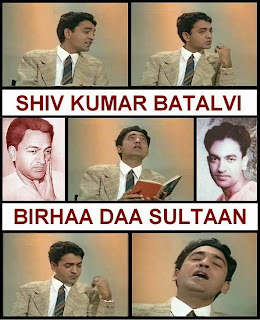Introduction
Shiv Kumar 'Batalvi' (Punjabi: ਸ਼ਿਵ ਕੁਮਾਰ ਬਟਾਲਵੀ) (1936 –1973) was a noted Punjabi language poet, who was most known for his romantic poetry, noted for its heightened passion, pathos, separation and lover's agony
He became the youngest recipient of the Sahitya Akademi Award in 1967, given by Sahitya Akademi (India's National Academy of Letters), for his epic verse play based on the ancient legend of Puran Bhagat, Loona (1965), now considered a masterpiece in modern Punjabi literature, and which also created a new genre, of modern Punjabi kissa. Today, his poetry stands in equal footing, amongst that by stalwarts of modern Punjabi poetry, like Mohan Singh and Amrita Pritam, all of whom are popular on both sides of India-Pakistan border.
Biography
Shiv Kumar was born in a Saraswat Brahmin family on 23 July 1936, in village Bara Pind Lohtian, Shakargarh Tehsil, Sialkot District (now in Punjab province, Pakistan), to Pandit Krishan Gopal, village tehsildar in the revenue department, and Shanti Devi, a housewife.
In 1947, when he was just 11, his family moved to Batala Gurdaspur district after partition of India, where his father continued his work as a patwari and young Shiv received his primary education. Allegedly, he was a dreamy child, often vanishing for the duration of the day, to be found lying under trees by the riverbank close to the Mandir or Hindu temple outside the village, lost in a brown reverie. He appears to have been fascinated by local renditions of the Hindu Epic Ramayana, as well as wandering Minstrel singers, Snake Charmers & the like - which feature as metaphors in his poetry, giving it a uniquely rural flavor.
Education
He completed his matriculation in 1953, from Punjab University[disambiguation needed], and enrolled in the F.Sc. program at Baring Union Christian College, Batala, though before completing his degree he moved to S.N. College, Qadian, where he joined the Arts program more suited to his persona, though he left that too in the second year. Thereafter he joined a school at Baijnath, Himachal Pradesh to do a diploma in Civil Engineering, here again he left it in the middle. Next he studied for sometime at Govt. Ripudaman College, Nabha.
Struggles With Conventional Matrimony
He fell in love with the daughter of the noted Punjabi writer Gurbaksh Singh Preetlari who was married off to a UK citizen because of caste differences between the two. It was during this time that he turned increasingly to alcohol for solace, allegedly writing the poem :"Ajj Din Chhadeya Tere Rang Varga" [ "Today dawned colored like your complexion..."] while standing outside a "Theka Sharab Desi" [Liquor Vend], waiting for it to open so he could buy his booze. He remained unlucky in love, and bereavement for love loss reflected intensely in his poetry.In early 1967, he got married, to a Brahmin girl, Aruna, of his parents & family's choosing. According to friends, he only agreed because she had a striking resemblance to his youthful love.
Youngest Recipient of Sahitya Akademi Award
Later in life, his father got a job as patwari at Qadian, it was during this period, that he produced some of his best work. His first anthology of poems was published in 1960, titled Piran da Paraga (The Scarf of Sorrows), which became an instant success. In 1965, he became the youngest recipient of the Sahitya Akademi Award in 1967, for his magnum opus, a verse play Loona (1965). His poetry recitations, and singing his own verse, made him and his work even more popular amongst the masses.
Soon after his marriage, in 1968, he shifted to Chandigarh, where he joined the State Bank of India, as a PRO. In the following years, bad health plagued him, though he continued to write prolifically.
Struggles With Conventional Life-Span
His writings have always been open about his pronounced death wish, and on 7 May 1973, he died at his father-in-law's residence, at Kirri Mangyal Pathankot, due to liver cirrhosis, a result of chronic alcoholism, at a young age of 36 years.
Personal life
On 5 February 1967 he married, Aruna, a Brahmin girl, from Kirri Mangyal, Gurdaspur district, and later the couple had two children, Meharban (1968) and Puja (1969).
Works
- Piran da Paraga (The Scarf of Sorrows) (1960)
- Mainu Vida Karo (Bid Me Farewell) (1963)
- Gazlan Te Geet
- Aarti (Prayer) (1971)
- Lajwanti (Touch Me Not) (1961)
- Atte Dian Chirian (The Sparrows of Flour) (1962).
- Loona (1965)
- Main Te Main (I and Me) (1970)
- Dardmandan Dian Aahin
- Sog
- Alvida (Farewell) (1974)
- Shiv Kumar: Sampuran Kav Sangreh (Complete Works); Lahore Book Shop, Ludhiana.
- Birha Da Sultan, (A selection from Shiv Kumar Betalvi's poems), Selected by Amrita Pritam, Sahitya Akademi, 1993. ISBN 81-7201-417-1.
- Luna (English), tr. by B.M. Bhatta, Sahitya Akademi, 2005, ISBN 81-260-1873-9.
Legacy
One of his anthology, Alvida (Farewell) was published posthumously in 1974, by the Guru Nanak Dev University, Amritsar. 'Shiv Kumar Batalvi Award' for Best Writer, is given each year.
In Media
Many of his poems were sung by Deedar Singh Pardesi. Jagjit Singh-Chitra Singh, and Surinder Kaur, have also sung many of his poems. Nusrat Fateh Ali Khan's rendition of one of his poem "Maye ni Maye" is known for its soulfulness and imagery. In a recent album, Rabbi (2004), by Rabbi Shergill features, his poem, "Ishtihar". Punjabi folk singer, Hans Raj Hans also did a popular album, ‘Gham’, on the poetry of Shiv Kumar. In 2005, a compilation album was released, titled, Ek Kudi Jida Naa Mohabbat... 'Shiv Kumar Batalvi, with numbers sung by Mahendra Kapoor, Jagjit Singh and Asa Singh Mastana.
In 2004, Punjabi play titled Dardaan Da Darya based on the life of Shiv Kumar was performed at 'Punjab Kala Bhavan', Chandigarh.
Shiv Kumar Batalvi
















